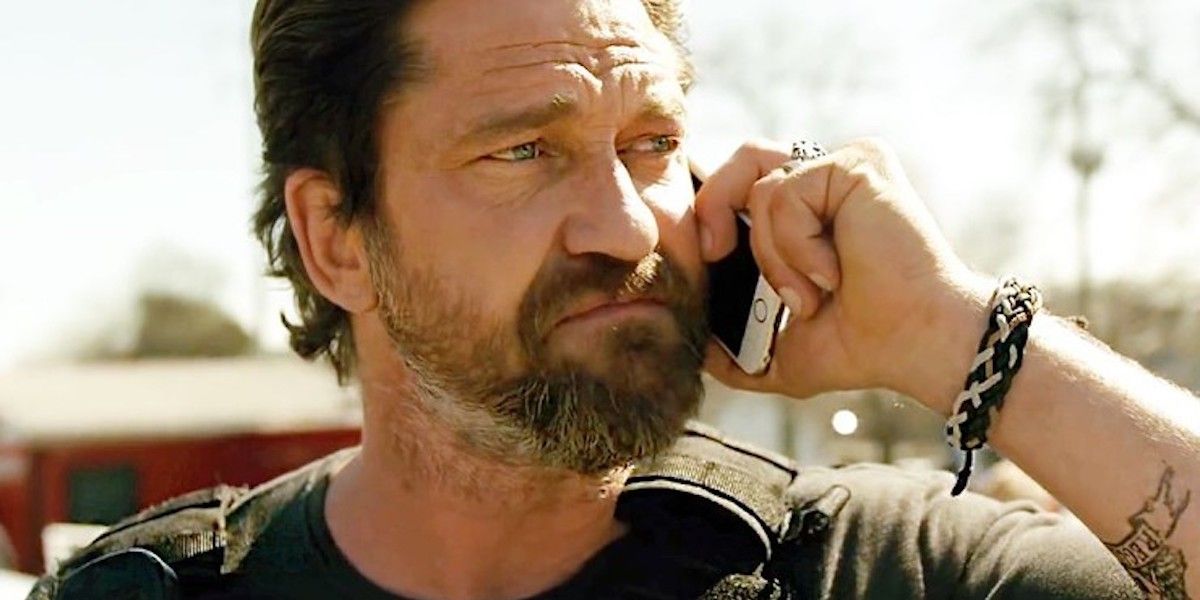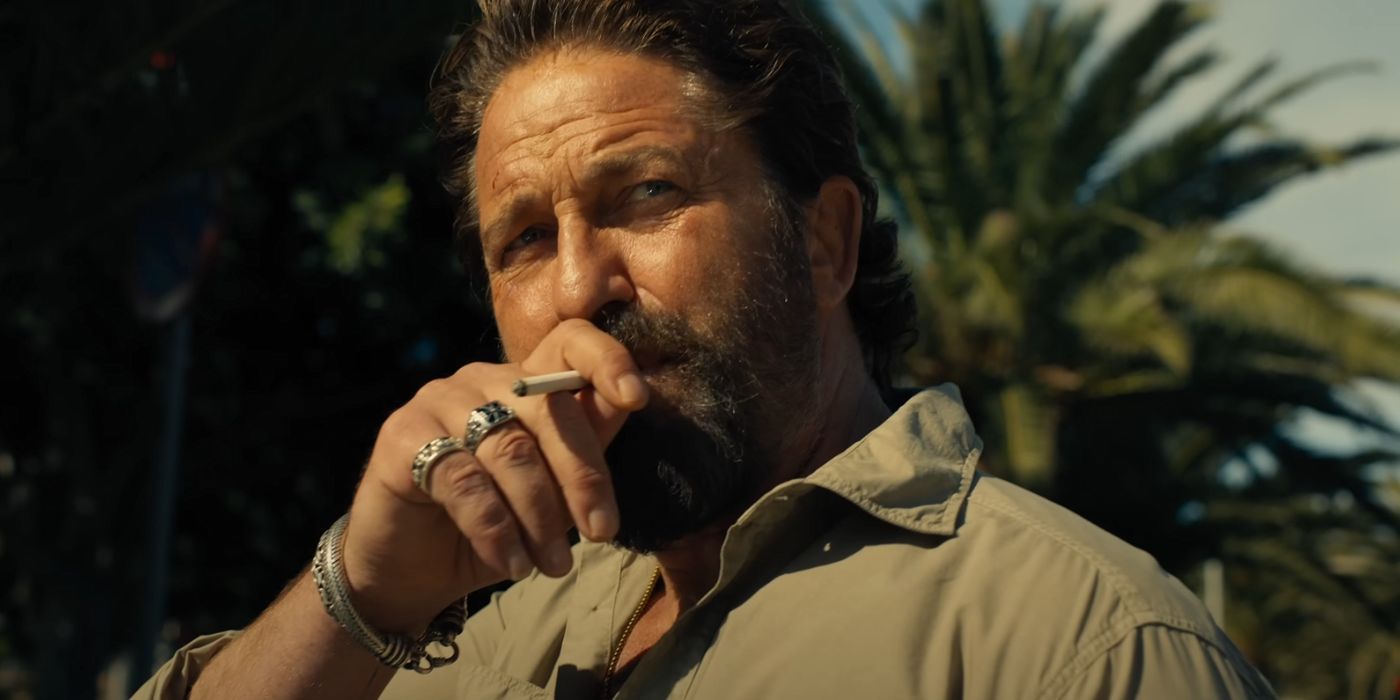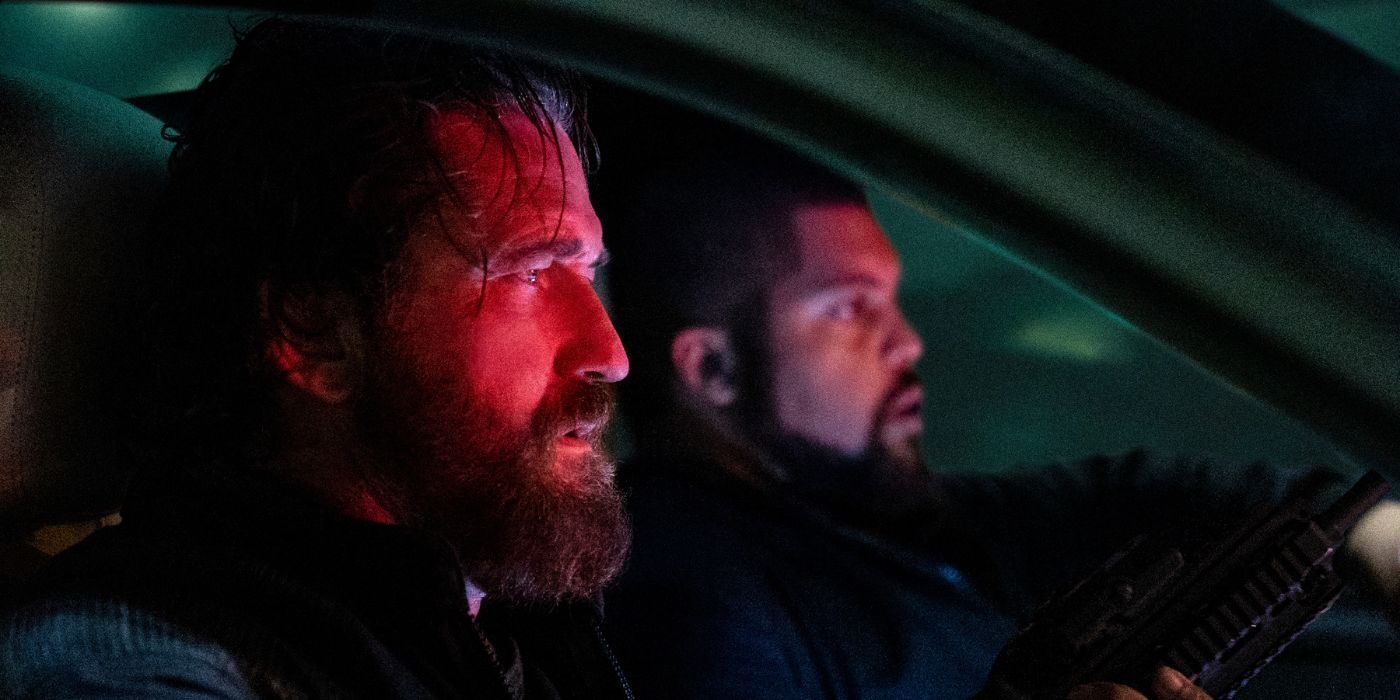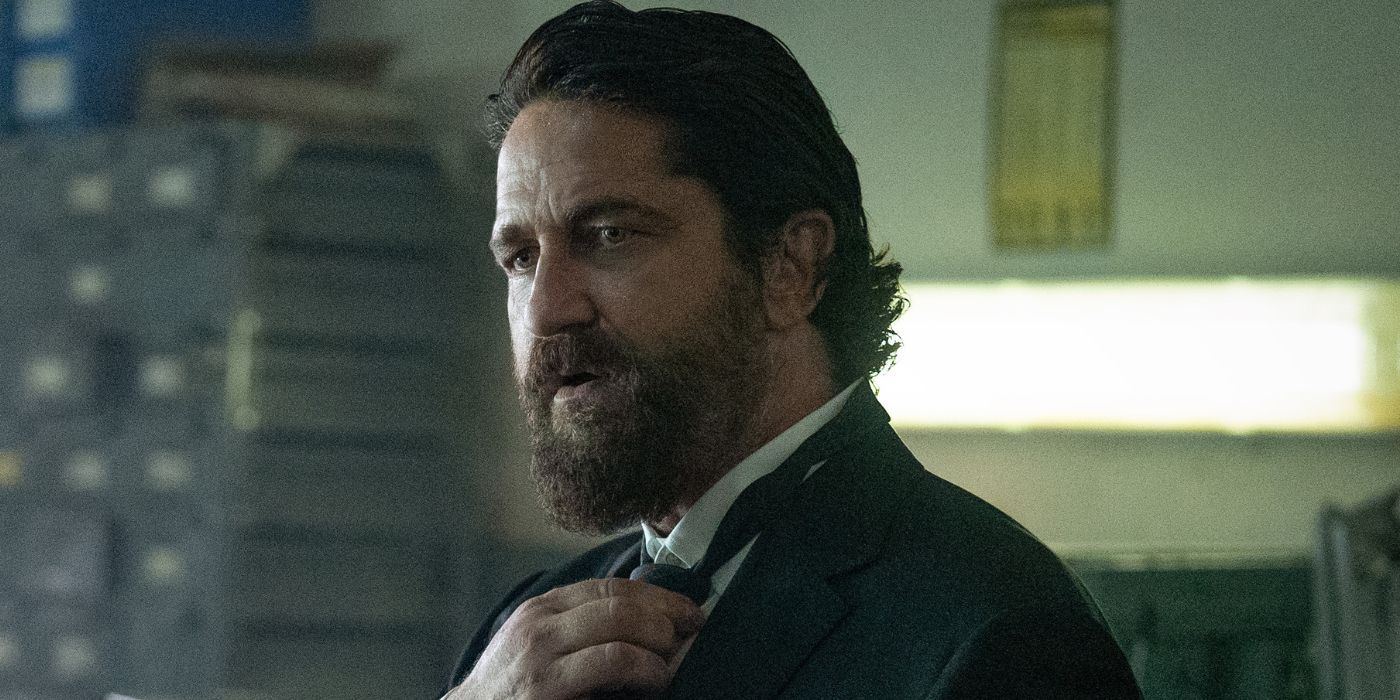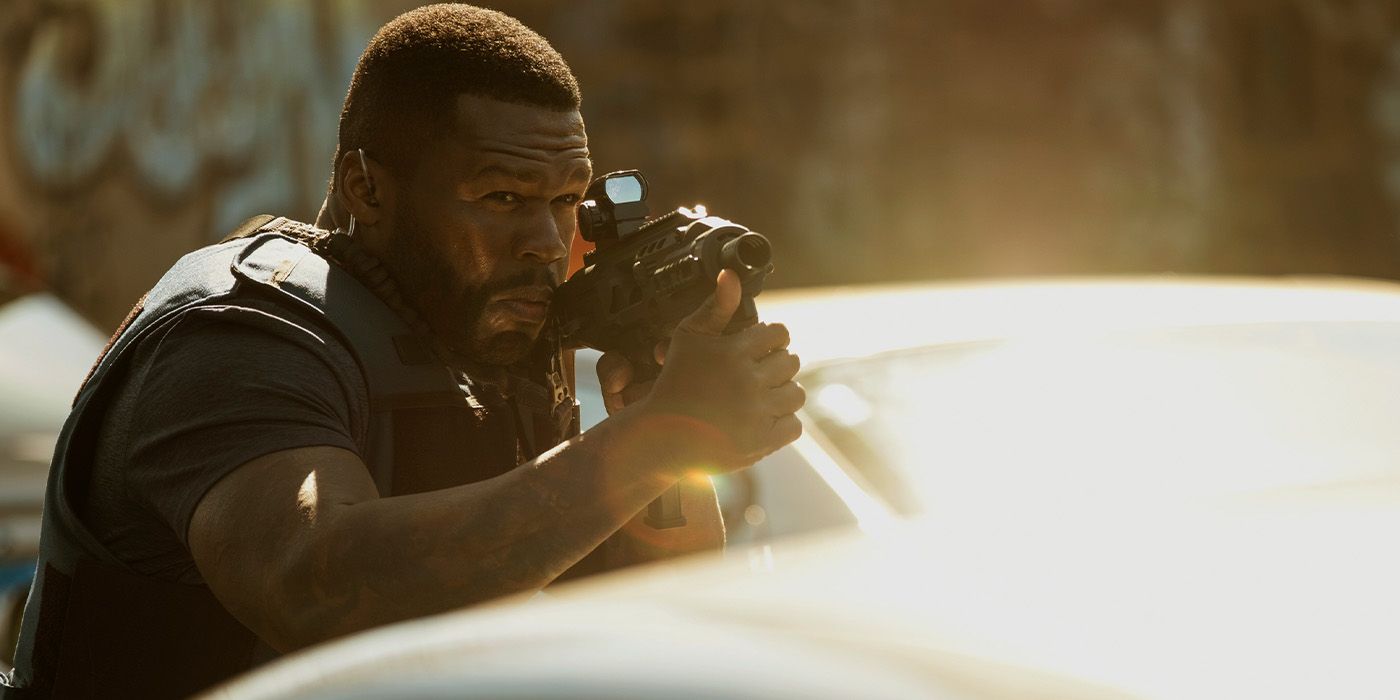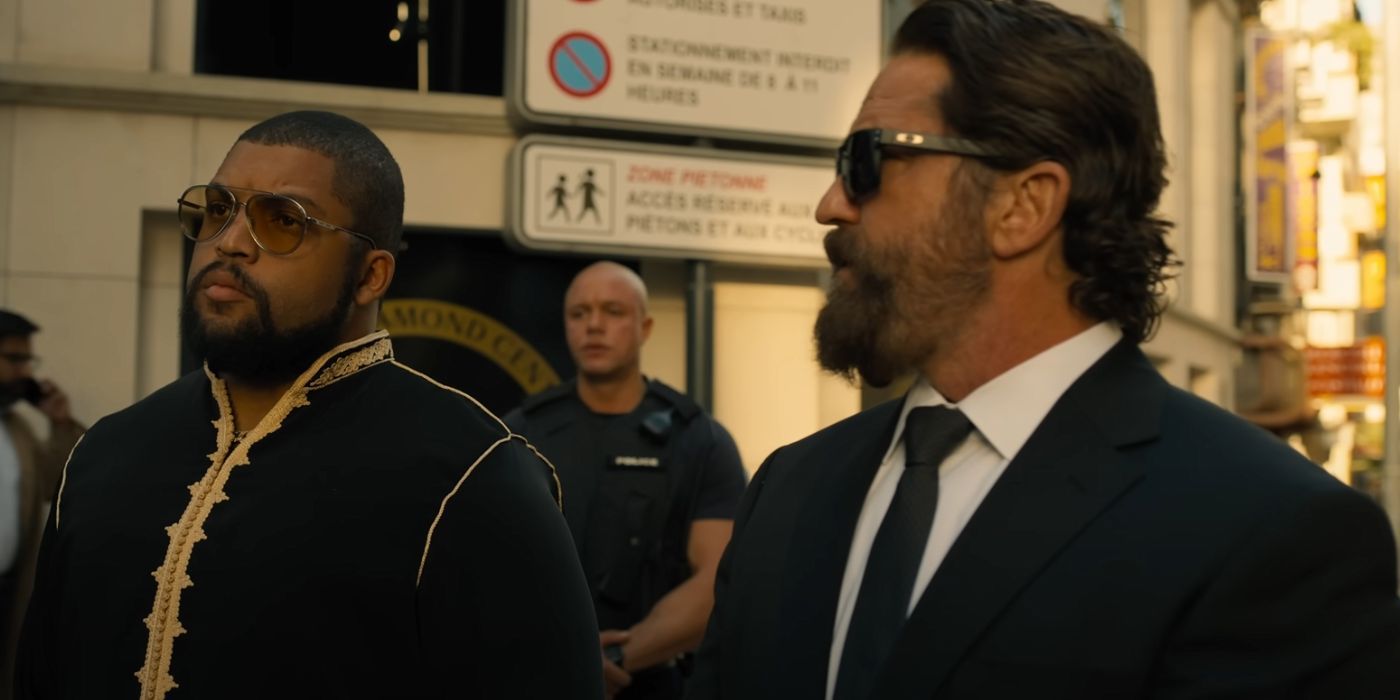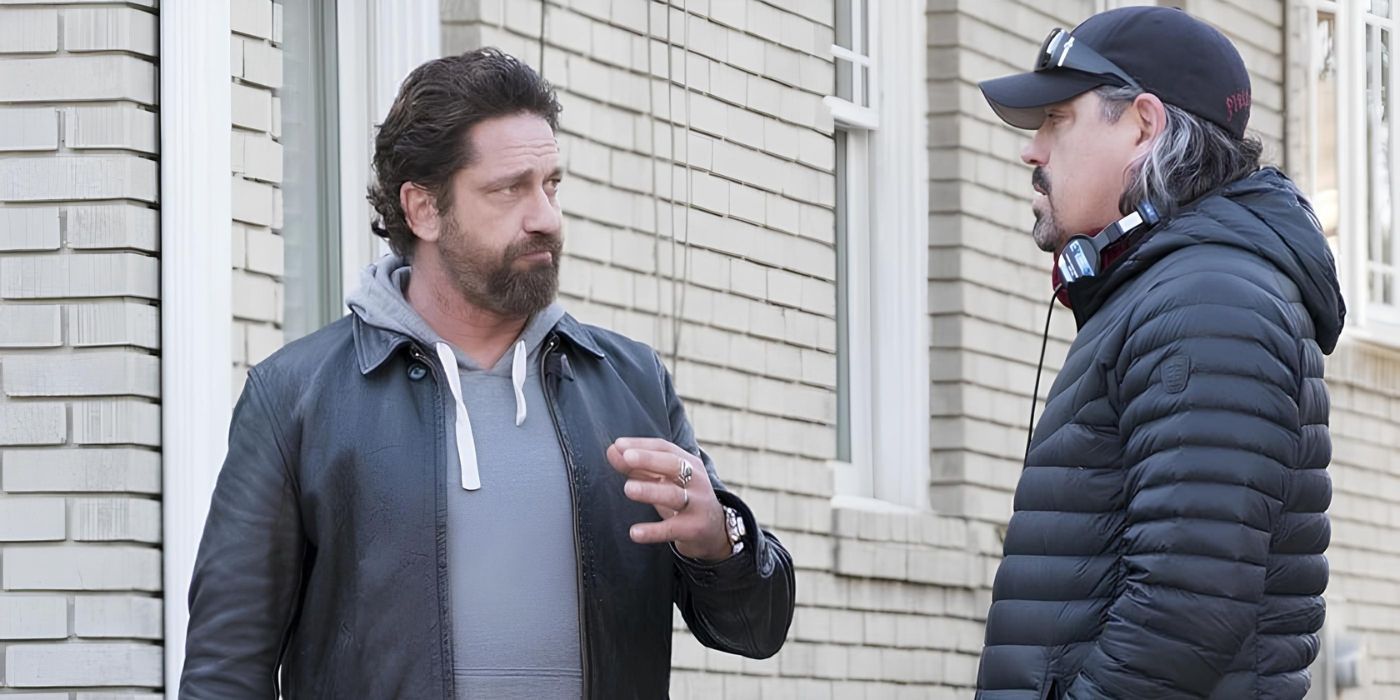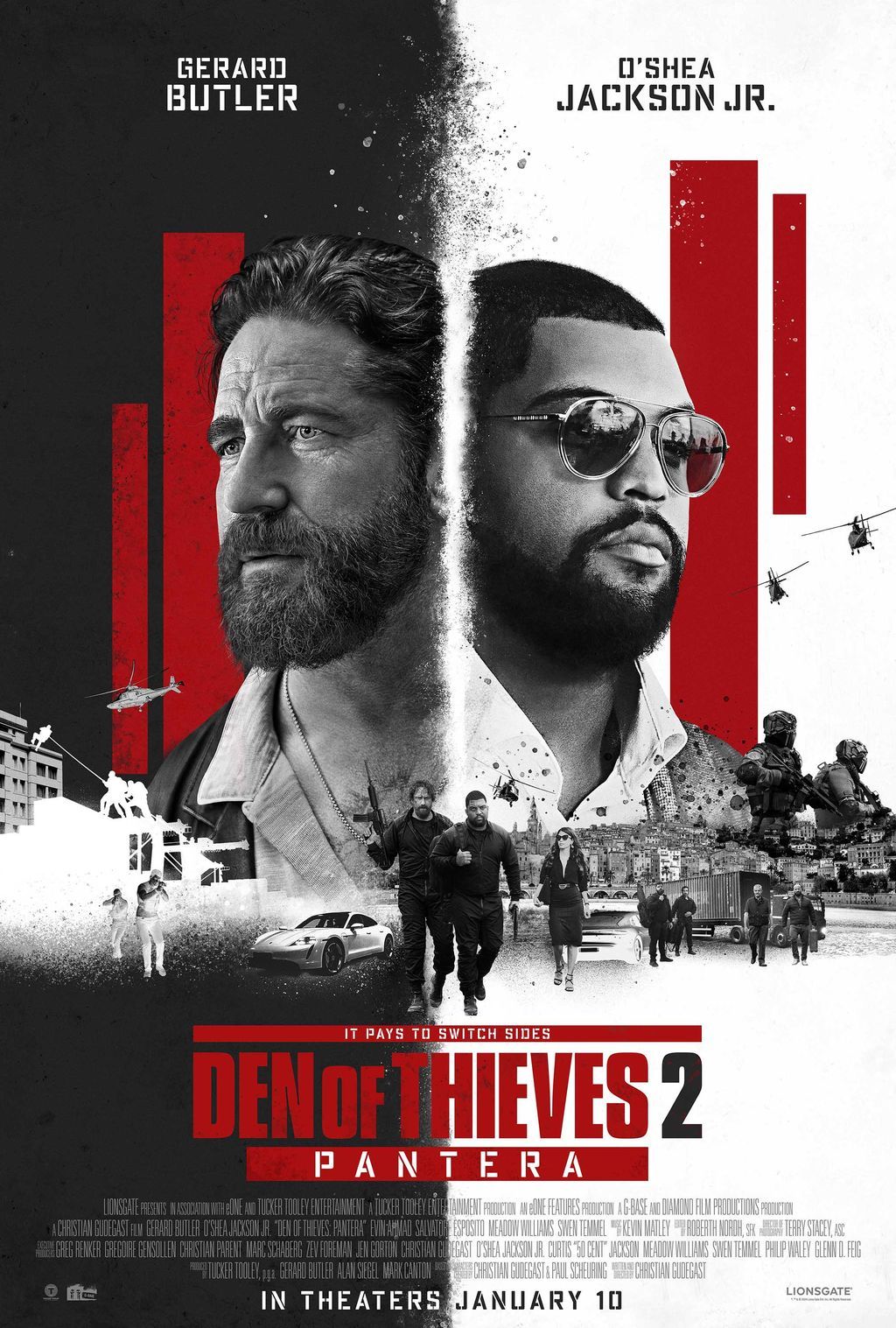
Summary
- Collider’s Steve Weintraub speaks with Den of Thieves 2: Pantera writer-director Christian Gudegast for our exclusive post-screening Q&A.
- Den of Thieves 2 sees Gerard Butler’s “Big Nick” and O’Shea Jackson Jr.’s Donnie team up for a major diamond heist in Europe.
- During this interview, Gudegast discusses the extensive research on real heists for authenticity, with plans for a global franchise, the behind-the-scenes of filming for Pantera in the Canary Islands, and details on his upcoming action thriller, Mafia X.
Den of Thieves 2: Pantera reunites Gerard Butler‘s “Big Nick” O’Brien and O’Shea Jackson Jr.‘s Donnie Wilson in a sequel that raises the stakes of its predecessor to a whole new level. Writer and director Christian Gudegast put in hours researching and talking with “a friend of a friend” who has information on pulling off real heists in order to take his hopeful franchise across seas, with plans to go global in subsequent films.
Pantera will see Nick on the other side of the law or at least joining forces with Donnie, who’s now involved with the Panther mafia, to pull off a major diamond heist. Even before Den of Thieves (2018) hit theaters, Gudegast knew that wasn’t the end of the line for these characters. “There was just so much material that we knew right away it wasn’t going to be a one-off,” he tells Collider’s Steve Weintraub during our exclusive post-screening Q&A. In fact, having spent “about two months” with actual thieves, the filmmaker has enough material to bolster an entire franchise, with plans to carry out at least three more films.
For the full conversation, check out the transcript below, edited for clarity, where Gudegast discusses the original plans for a series, how Butler was pivotal in the movement of this sequel, and what information he received from Nick and Donnie’s real-life counterparts. He also talks about taking over an airport in the Canary Islands, working with Porsche to rewire their cars unlike they’ve ever done before, the director’s cut of Den of Thieves and deleted scenes, and reveals details about Den of Thieves 3 and his action thriller, Mafia X.
How Hollywood Has Changed Since ‘Apocalypse Now’
“They just don’t make movies like that anymore.”
COLLIDER: I have a million questions for you, but first, I want to say congratulations on getting to make a sequel.
CHRISTIAN GUDEGAST: No small task. Trust me.
Making movies right now is, more of a miracle than it’s ever been. So, what do you think would surprise people to learn about being a writer-director in Hollywood?
GUDEGAST: I would just say how hard it is to make movies these days. Particularly to get new content, new IP that’s not like a ‘70s TV show or a Marvel comic or whatever. To do something original and to be able to build a franchise is next to impossible. Just getting something to production is by far the hardest thing. When you’re in production, production is very hard, long hours, manual labor, zero sleep at all, and very physical. You’re outside, and it’s either hot or it’s freezing. It’s hard work. But comparatively, it’s almost a celebration, comparatively to development and getting something to production because it’s such a grind, and it’s very, very difficult just because of everything from the schedules for actors, there’s the whole studio system, and financing is difficult. So, that is definitely the hardest part of the whole process.
If you could go back in time to the beginning, all the way back to the beginning of cinema through now, what’s something that you wish you could have worked on as a writer, and what’s something you would have loved to have worked on as a director?
GUDEGAST: Oh, god. Well, just to be there, Apocalypse Now because they just don’t make movies like that anymore. To shoot in the Philippines in some third-world country where the entire military are supporting you and shooting for over a year. I mean, it’s just it’s insane. Even Heat, for example, I think they shot for, like 125 days, and they shot in downtown L.A. They took over the downtown streets. I mean, good luck doing that today.
As a writer, god, Raging Bull. As director, Road Warrior, Mad Max 2, just because the stunts. Again, you look back at some of the old movies and the shit they’re able to get away with, you’re just like, “Oh my god, you could never do that today with insurance.” No chance. They’d laugh at you. So anyway, God bless those movies.
Michael Mann is working on Heat 2 script right now, and I am so wondering how many days he’s going to get to shoot and what it’s going to be like versus film.
GUDEGAST: Seriously. Especially with the tax rebate system now, and you rarely shoot a movie where it’s set. Whenever you go location scout for the first time, you write a script and send in whatever part of the world, and then you’re shooting it somewhere else. You have very specific ideas about what something’s going to look like, and you go through these first locations in whatever other country, and you’re kind of depressed for a few days. Then the reality of the making of the movie dawns on you, and then you go, “Okay, well, we’ll make it work.” But initially, it’s a little bit depressing.
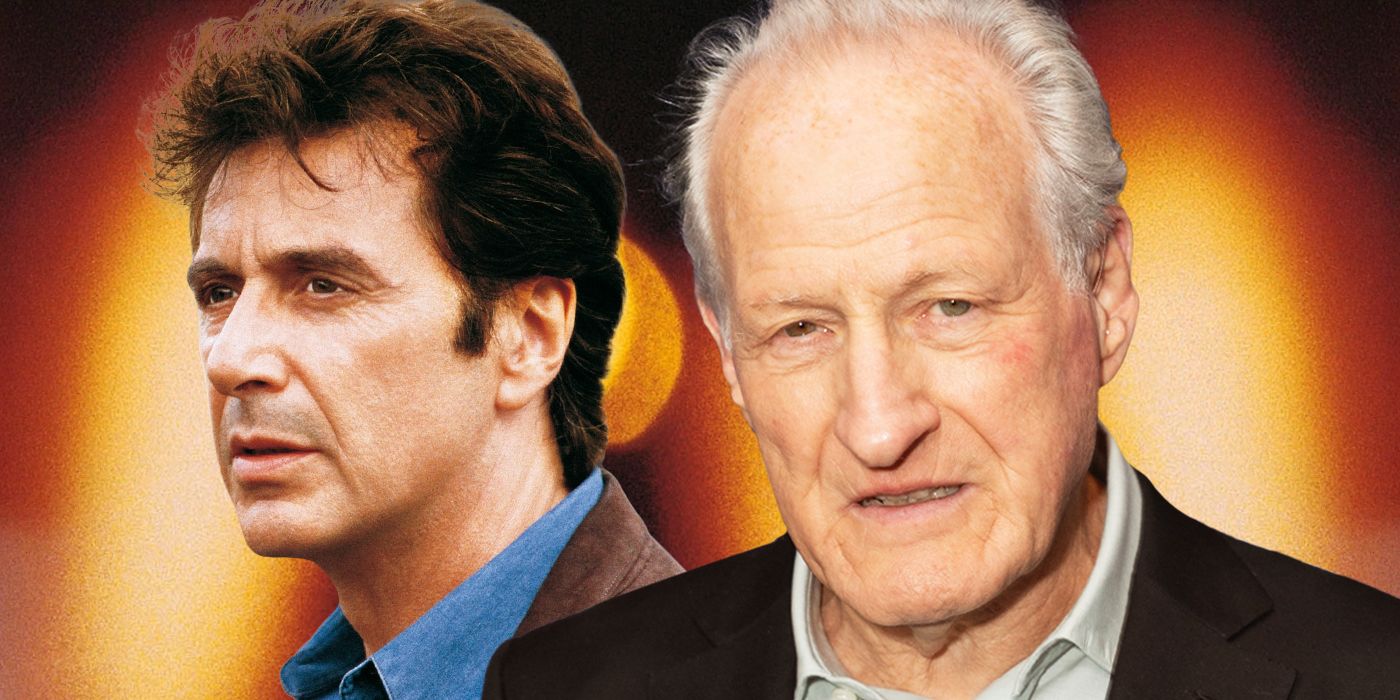
Related
“There Was Courage at Disney In How We Approached It”: Michael Mann Reflects on ‘The Insider’ 25 Years Later [Exclusive]
Infiltrated editing rooms, a 300-page screenplay, and Disney pulling Award season support – just a handful of the BTS details Mann drops.
It’s sort of like what happens when you watch your assembly cut for the first time.
GUDEGAST: Exactly.
From Screenwriting in Hollywood to Helming Blockbusters
“I never really set out to be a writer.”
You’ve been working as a writer in Hollywood for a while. How long have you been thinking about directing, and how did you get Den of Thieves as your directorial debut?
GUDEGAST: Well, I actually never really set out to be a writer. I went to UCLA Film School, I made my movie and all that, did very well there, was very well received. I was a director-writer. You do everything. You shoot the damn thing and everything. But to graduate at the time, you also had to write the script, so my old writing partner and I, Paul [Scheuring], wrote a script, and we sold it before we graduated to Oliver Stone, which was crazy. That just completely changed the trajectory of my career. At the time, it was, like, direct music videos or commercials and work your way up, but that wasn’t guaranteed. The Michael Bay’s of the world kind of did that, David Fincher, but most of them ended up just sticking with music videos and commercials and not transitioning to features. To be a writer writing feature film scripts for the studios was a much better way to eventually become a director. But then, the realities of life and making a living, and so I stuck with that for longer than I ever thought I would.
Then, we got this up and running. I wrote the script initially for New Line Cinema, and then it got moved over and would turn around to Relativity. We were going to make it with [Mark] Wahlberg in the 2015 range, and then Relativity went bankrupt. So, that’s fun. Then, it took years to get out of bankruptcy court, and in the process of, I got to know Gerry [Butler] working on some other movies like London Has Fallen and some other ones that didn’t end up being made, which is the majority of stuff. Then he became attached to this, and then we ended up making this one. But again, it was all getting out of bankruptcy court, which took, like, three or four years.
How did you get everyone to agree on the financiers, like, “Oh, you can direct this?”
GUDEGAST: I’ve been a photographer my whole life. So, I will write the script, and then I will go off and basically photograph the script, like the movie, in still photographs. I’ll go to the actual locations, I’ll find the people that all the characters are based on, people that I know, the inspiration for those characters down to the smallest detail, and I’ll go photograph them wherever they are — in the sheriff’s department in Whittier and the thieves in Long Beach. Whatever it is, I’ll go photograph them. I’ll go to the location where it’s set, and I’ll photograph the way I want to shoot it. Then, when somebody reads the script, I’ll say, “Do you want to see the movie?” And I’ll go, “Here,” and I give them a playlist soundtrack so they can listen to a soundtrack that’s the movie and literally flip through this 200-page lookbook that’s shot exactly in 35-millimeter film about the whole trip, and it looks exactly like the way I want it to look. So it becomes very, like, “Oh, wow, okay, I can see the movie now.” It becomes very, very clear. That was my path, at least.
Who was the financier you had to really convince? Was there one person that ultimately said, “Yeah, you can do this?”
GUDEGAST: Gerry, really. Because the reality is that movie stars, right or wrong, get the film financed. I mean, there was a studio liking something and all that, of course, but then it’s who’s going to be in the movie, and that dictates how much you get to spend on the film. So, it was convincing him, but he was convinced pretty much right away. It was a very, very thorough presentation, and then it worked.
The Next ‘Den of Thieves’ Sequels Are Already Mapped Out
“We have many, many of these to go.”
For the first film, when you came up with the idea and you were working it all out, how dramatically did it change along the way?
GUDEGAST: Not that much, actually. Not much in terms of what’s on the page. The changes are really the realities of production, right? This is the case with everybody. Where are you going to shoot the damn thing? And so we shot it in Atlanta. The challenge there was, obviously, the architecture, and your light is an issue to a degree, but really the architecture. Everything in Atlanta is brick. It’s the South, they have tornadoes, and things are built with brick. Very few things out here are built with brick these days because of the earthquakes. So, I basically rented a car. I spent a few months down there, and I drove the entire city and the suburbs of Atlanta looking for every little location, little slivers of buildings or blocks or whatever, that looked kind of like L.A. We pulled off, and we shot here for about two weeks to fill in the gaps, but the biggest challenge is that we have to do those rewrites or polishes based on the realities of, “Okay, this is how long we have to shoot. This is where we’re going to shoot it.”
When just the script existed, people didn’t really consider it an action. It’s sort of like a heist or a crime drama — I’m talking about Den 1. There was much more to 50 Cent’s character and so much more to Merrimen’s character. There was a whole backstory of him, and when he got out of prison, you followed him for the whole day. It was a lot more character stuff that, unfortunately, had to come out because that dictates the running time. We shot some of it, some we didn’t. There’s some in the director’s cut, which we just did a Dolby mix of, which is badass, if I might add. Then there’s the studio and the marketing and the running time of the film. It’s gotta play in the theater at least five times a day, so it’s gotta be two-whatever [hours]. That’s the beauty of streaming now is that you have this long form. You’re able to explore the characters and world.
When I was researching Den 1, there was just so much material that we knew right away it wasn’t going to be — you hope that it performs, and luckily, it did — a one-off, but that we have many, many of these to go. The next one’s already ready to go, and then 4 and 5 are already mapped out simply because of the amount of material to come across and where we want to take these characters.
I have so many follow-ups. First of all, awesome. We’ll get to these things, but when the first film came out, at what point did you realize, “Oh, we’re going to be able to make a sequel?”
GUDEGAST: Opening weekend, basically. I mean, we just kind of manifested the universe kind of thing, like, “We’ve got to make another one.” Luckily, it performed and performed very, very well. Even after, our box office was good. It wasn’t stellar, but it was solid.
I could be wrong, but I think it made $80 million globally.
GUDEGAST: I think it was $88, but yes.
Like I said, I could be wrong. But the key is you didn’t make it for $88. It was a much lower budget.
GUDEGAST: Much lower. Yes.
So, it was profitable in theaters.
GUDEGAST: Yes, and then after the fact, it was very profitable. So we were able to make another one. It’s weird now, like, “What’s screen-worthy? What’s cinema-worthy?” That’s the big question. I understand for the studios it’s a tough call. It’s like, “What’s going to get people to go to the theater when you can just stream it or buy it in a few weeks?” So, it’s a difficult math to figure out for sure.
When you were making the first film, be honest, had you thought about, “I want to make a number of these?” When you were writing the first one, were you thinking about, “I have the idea for the second. I have the idea for more,” or was it like, “This worked. Now we can figure out the rest?”
GUDEGAST: Both because of the realities of it having to perform. But I had a notes file that myself and the producers and Gerry looked at that was all of these other ones, because while I was researching, I came across so many fascinating characters who told me so many stories about so many different heists and the specifics of them that are fascinating. We were like, “Man, we could go on and on forever.” There was a minute we were talking about actually doing a series, and then that went away. But we hoped, and we knew what we wanted to do, but then, of course, it has to perform something, and luckily, it did.
Everything in the Den of Thieves Franchise Is the “Real Deal”
“The next one’s going to be crazy.”
I am very curious about the sequel, jumping into the writing process. You find out you’re going to be able to make it. What are you immediately thinking about in terms of, “What’s the story I want to tell? What’s the heist?”
GUDEGAST: I knew where we were going, and the process is this: I wanted to take the characters to Europe, and I knew a few different heists that I wanted to focus on. When I do research, my whole thing is, when you’re a writer, you want to write about whatever — Navy Seals or crime or a concert; if you’re a diligent writer, you go do your research, and then most of the time, you maybe meet somebody, you have a friend of a friend or some kind of a contact, and you go meet the guy. You meet him at Starbucks and talk for an hour and get his email, maybe watch some documentaries or watch movies, whatever. But for me, I think the thing is, when you do that, that person you’re meeting was like, “Oh, I like Hollywood, so that’s kind of cool. Let’s talk to this writer guy about a movie. That’s kind of exciting,” and you don’t really get the real shit when you do that. I wanted to not be like a tourist in that world. I wanted to really get to know the people, to really know what time it is, like, who they are as human beings, and like the real details and what their lives are like and emotionally why they did all those things.
So, I went to Europe initially and met with cops, law enforcement guys, who were members of the Diamond Police. They were the guys responsible, the lead investigators of the heist, the movie was based on. I spent about two months with them, and they completely opened up about everything. I really got to know them. I went to the actual locations where the heist took place. They showed me everything, how everything was done, and it just blew me away. There are so many details we couldn’t even put in here. But everything you see here, that’s the real deal, both at the airport and at the Diamond Center. Then, after that, I went to the Balkans and met with the thieves, and I spent a long time with them. A long time. They were actually on the set with us the whole time, as was the one guy, Gregoire, who actually is in the scene in the very beginning in the airport when it cuts to the cop in front of the screens. He was the head of the Diamond Police with the lead investigator on those major heists.
Then another guy named Slavko — the rest will remain unnamed — did some things, and he opened up that world to me. I mean, opened it up. So I really got to know everybody and hung out with them and drank beer with them, got drunk with them, the whole deal. They told me everything, and I even drove around with them. We’d go by places, and they’d talked about how they would break in. It was crazy. So, all the characters are based on people that I met, and they are a lot like him.
Did they tell you some stuff where you’re like, “I can’t even put this in the movie because no one’s going to believe this?”
GUDEGAST: Correct. Look, truth is stranger than fiction. Truth is far more fascinating than fiction, always. If you do the work, it writes itself. I honestly don’t make anything up. I really don’t. I just go do the research. I really do the work for a long time. It just writes itself. My notes files are crazy. They’re, like, 50, 60 pages, and it’s a treasure trove. You kind of stack it, put it together — that goes there, that goes there — and you look up like, “Holy shit, I’ve got a movie.” It’s really that simple.
Some stuff I couldn’t put in because of sensitivity reasons or whatever, but all the technology in here is real. The company is in Canada. They were going to provide materials and couldn’t because right when we were in production, they got contracted by the Department of Defense… The monitoring cycle, the way they beat that system, how they timed it — that’s how they did it. When you actually see it, you’re like, “Damn, this is crazy.” It’s endlessly fascinating. And again, I’ve got so much material. The next one’s going to be crazy.
‘Den of Thieves 2’ Took Over An International Airport
What shot or sequence in the sequel was the one that was the toughest to pull off, the one that you were nervous about?
GUDEGAST: That wide-low when we follow the two cop cars as they race up to the to the cargo hangar at the beginning across that airport tarmac, that logistically was almost impossible. We took over an international airport. That was one of the reasons why we shot in Tenerife; we literally were able to own an international fucking airport for six hours after midnight until 6 a.m. for a week. That’s, like, impossible. Good luck doing that anywhere here. So that shot, when we were able to get that, was like, “Oh my god, we’re gonna drive across the tarmac? Wow.”
I actually wanted to know why you filmed in basically the Canary Islands.
GUDEGAST: Initially, we were going to do it in Serbia in Belgrade and Zagreb, and then the war hit with Ukraine, and then all the expats, everyone from Ukraine, fled, and they went into Belgrade and Zagreb. So, literally every hotel was full, every Airbnb was booked. There was nowhere to house the crew — literally nothing. So we pivoted to France, where it’s sort of expensive, but then we worked out the tax credits, and it was going to work, but then the exchange rate changed, and so that didn’t work anymore. Then we went to Spain, and then we ended up in the Canary Islands, and just the architecture… My production designer, Sébastien [Inizan], is French, so he obviously had knowledge of what everything looks like in France, so we were able to reproduce that in the Canary Islands, so we were able to shoot there. But really, it was that airport. The ability to take over the airport was like, “Okay, we’re going there because we can own the airport,” which was just insane. I mean, that just doesn’t happen.
What was the second shot?
GUDEGAST: The second thing was the shootout at the end of the tunnel. One of the difficulties when you shoot in smaller places around the world is the crews are fantastic, they were wonderful, but the place itself, like the local government, the city, municipal, whatever, they’re not used to having movies there. Our location manager got a tunnel that was three kilometers long. From action to cut, we had about 40 to 50 seconds of a take so we could the whole scene, the actors could play it, and the stunt guys could get in and out of the windows. It was very elaborate, and we had 40 or 50 seconds, which is great. Well, the location guide, because of a language barrier or whatever the hell — and God bless him — he neglected to tell the city, which is outside of Santa Cruz, the capital, that we’re going to be shooting blank guns. They’re like, “You can’t shoot guns there.” We found this out three days before shooting. I mean, we’re in the middle of shooting, I’m working freaking 18 hours a day. They’re like, “Oh, we can’t shoot in the tunnel on Friday.” I’m like, “We can’t what?” So we all had a heart attack.
So the tunnel we shot it in was actually seven seconds… It was above the city like this and went down, and it was seven seconds. It was actually not a tunnel, it was an overpass for the port. So it was seven seconds and back up again. Imagine on the radio, “Action,” and the actors are getting into it, and they forget one fucking line, and it’s like, “Cut.” Fuck, we’ve got to reset and come back again. Fifty minutes go by and you’ve got to drive all the way around, there’s a whole loop around, and come back. “Alright guys, sorry. We’ve got seven seconds. Speed up.” It’s a series of seven seconds, seven seconds, reset, reset. Reset is a bitch. You’ve got to get the cars to come back again. It takes 10, 15 minutes every single time. So, that was crazy challenging, but you make it work.
We changed where we shot it a little bit. We pulled the cars and pushed the cars. When we’re pulling them, we’re at the end of the tunnel, and when we push them, we’re at the beginning of the tunnel. So, it was a challenge for everybody from the shooting to the editing. But, you know, it’ll happen naturally.
Porsche Worked Months to Rewire Their Cars for ‘Den of Thieves 2’
“They’d never done it before.”
I read could be wrong that you basically got lucky with those Porsches in the movie.
GUDEGAST: Well, yes and no. Porsche was an incredible partner. By the way, speaking of work companies, they are an unbelievable company. They are run so well. They’re just awesome. In European prepping, it’s like, “Okay, we need all these vehicles,” and then you talk to all the automatic manufacturers, like Volkswagen, Peugeot, Opel, Renault, Mercedes, Porsche, and Porsche stepped up immediately. They don’t really do much advertising at all, and they fell in love with the script. I got on a Zoom with them and I told them what we were going to do, and that I’m a car guy and I love Porsches. We set it off, and then they said, “Look, we’ve got five.” And I wrote in the script, ironically, and the reason why I wrote Porsche Taycans is they needed it for performance purposes, they’re also electric, and for stealth purposes of the actual heist, electric is way better than a gas-powered car because, obviously, it makes no sound. It makes very little.
So I told him, I said, “Look, I wrote the Porsche in the movie for a reason — the stealth factor and performance on it.” And he’s like, “Well, you’re not going to believe it.” I was like, “What’s that?” The cinemag gods were looking out for us that day; he was like, “We have five Porsche Taycans we’re about to destroy,” because they were going to reoutfit them for something and they were no longer street-legal. I was like, “No, no, no, bring those around.” So they did, and what they did was — I don’t think it’s ever been done before — they took all the Porsches and all the controls in the car, the steering, the throttle, the break, everything, and they rewired them.
This took months from the head engineer from North America, Germany, and then all the engineers were there. It was crazy. The controls were put onto the roof of the car. The reason we had to have that is, normally when you shoot driving scenes, you have rigs outside the car. The camera’s outside the car and you shoot it over the passenger, over the driver, but we didn’t want to do it that way. We wanted to be inside the car, and that means the cameraman’s got to be inside the car, meaning the driver has to be driving, but the driver’s an actor, and he can’t perform legally, and he can’t anyway because we’re driving on these crazy roads, shooting everything. So all we do is put the driver on the roof. So the drivers on the roof of the car, and meanwhile, O’Shea can pretend to drive and can perform. When we got out of the tunnel, those roads were gnarly, and we were hauling ass. It was like, “Dude, this is no joke.” The stunt drivers are nuts. They’re incredible. They’re on the roof the whole time, and that’s all because of Porsche. They’d never done it before. They’re like, “We’ll figure it out.” Then they did it, and they’re driving the car around, and I’m like, “Oh my god, this nuts.”
I just have to know, what are the actors’ reactions when you tell them what you’re about to do and the fact that there are those crazy drops and you’re putting the drivers on the roof? It’s fucking crazy.
GUDEGAST: O’Shea was like, “Bro.” What’s funny is, O’Shea said, “Dude, I’m not going to the ocean. I’m not getting in the helicopter. I need a stunt double.” I’m like, “Dude, you could do it.” He’s like, “No, no.” Then, the day of, we always had his stunt double ready to do whatever, and to his credit, my man, he did everything. He jumped in the ocean. By the way, when they’re in the ocean, that was the ocean. There was no tank, there was no nothing, there was no cage. That was a sharkey, cold-ass ocean, and they were in it for a while. So me and the DP, we were like, “We gotta help out.” So we stripped down to our speedos, and we jumped in the water a few times. We were like, “We’re here with you, bro.”
But the driving part, the drivers were incredible. That one crash when we crashed the Porsche into the wall, we did that in one take. It was so narrow, and it is a drop to your death, no fabrication, and he had to spin the car perfectly and hit the back with them in the car and not kill themselves. It was insane. We practiced a million times yesterday, and then the day of, we were like, “Oh my god, it’s actually happening.” And the dude did it in one take. It was like we won the Super Bowl. It was a really cool moment.
I could do a lot of that stuff, but I could never do the ocean. That’s not for me. One of the things about these movies is all of us enjoy watching it, but it must be a pain in the ass to film. So talk a little bit about what it’s actually like to write the heist, even though you’re getting it from people who did it, and then actually filming the heist because you’ve gotta make it where everyone believes what’s happening.
GUDEGAST: That part is hard because it’s little pieces, and you’re not shooting it necessarily always in consecutive order, and you’re in different locations. That’s one of the jobs of the director. You’re reminding everybody, “Okay, this is where we are in the story. This is the tension level.” So that’s laborious. It takes a long time. It’s slow. You don’t see the fruits of your labor there at all. You can only really see it in the edit. But you trust what’s on the page. If it’s on the page and it’s right, then you know you’re probably going to be okay. That’s part of the craft of it all. The most fun is definitely shooting the dialogue scenes where actors can perform. On the day, that’s much more fun, but that’s just part of the craft.
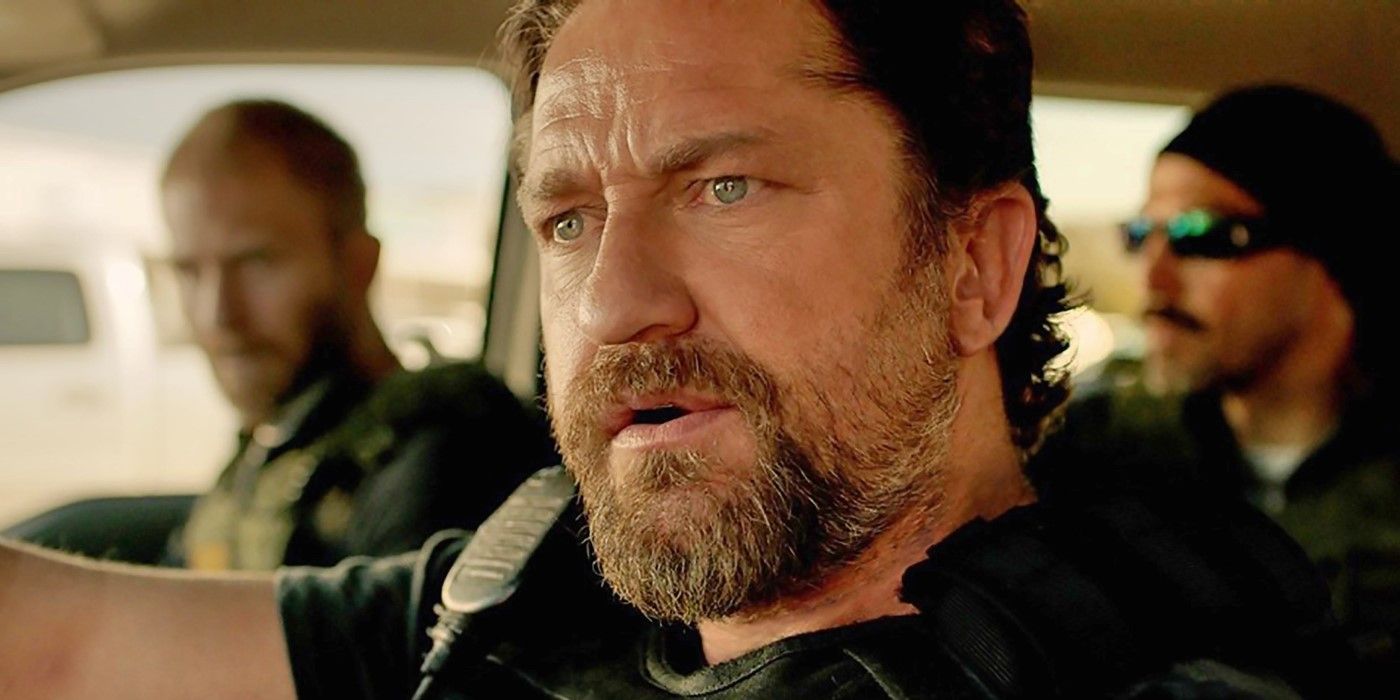
Related
Gerard Butler and O’Shea Jackson Jr. are Ready for Round Two in First ‘Den of Thieves 2: Pantera’ Trailer
The thieves are back after six years.
So you have a cut of this that you’re happy with. I don’t know if you did a friends and family screening, or test screening, but what did you learn after you shared with people?
GUDEGAST: It’s weird when you’re in the edit, you and your editor, for like nine or 10 months or whatever, in a dark room, and in this case, we’re in Sweden, Stockholm. I do this because I love movies — you’re the audience. You’re watching like, “Is it good? Is it good? I think so.” You don’t really know. It’s tough to say. You go with your instincts. Then, when you start putting it in front of people, as you said, you learn a lot of stuff, like, “Oh, it’s kind of slow. Oh, that joke worked. Oh, they think that’s tense.” What you really learn is that the conventions of cinema work, like tension building. If you do it right, it works. Audiences respond to it. You trust your craft and your instincts.
Did you make any changes as a result of those screenings?
GUDEGAST: Yes, we changed the ordering of scenes. And again, this is so much to do with the running time of the movie and for theatrical release, and all that. The director’s cut actually progresses differently. I’m not comparing one to the other, I understand what has to be for the theater, but the ordering of the scenes was different. It’s more propulsive. The whole challenge was, “How do we get Nick to Europe fast?” But we need to calibrate Nick emotionally. We have a lot to start establishing with Donnie, and we have a lot to establish with Nick. He’s got to go to Europe, and he’s going to change sides, so how are you going to believe that a cop changes sides? Well, I talked to all my technical guys and cops who do that, and they have to be in a certain place in their lives. That takes time to establish that. There were actually a lot more scenes doing that we ended up cutting. So it was really that, and just getting Nick to Europe as quickly as possible was what we learned from the initial test screenings.
Gudegast breaks down an emotional scene with 50 Cent.
Down the road, there will be a Blu-ray or a home video release. I don’t want to get you in trouble, but will there be an alt cut eventually that fans will be able to see?
GUDEGAST: Yes.
Is it the quote-unquote director’s cut or an extended cut?
GUDEGAST: Whatever you want to call it. We’ll call it a director’s cut. We just did the director’s cut for Den 1 in the Dolby mix.
I wanted to ask you about that when you mentioned it. Did you release a director’s cut on home video for that?
GUDEGAST: We did, but it was half-assed. I don’t think it was colored or mixed all the way. Now it’s the real deal.
Are there more scenes coming that weren’t there originally?
GUDEGAST: Yes, in Den 1. Yes.
Is this new version a lot longer than the original home release?
GUDEGAST: It’s, like, the 2:27 range.
The new one?
GUDEGAST: Yes.
And how much longer is that than the release before?
GUDEGAST: Fourteen minutes.
What’s the one scene that you were able to add back in that you’re really happy is finally there?
GUDEGAST: 50’s character, Enson, had a whole prom date scene. That was the result of a scene we never ended up shooting, unfortunately, where he went to church and saw Gus the cop. His daughter skips out of church early, and he goes outside to the park looking for her, and she’s talking to a boy, her prom date. He’s all gang banged out, and then Gus, the cop, comes out, and he sees that, and they look at each other, and Gus says to him, “You got your hands full there, bro.” And he’s like, “Yeah, tell me about it.” And then, in the car on the way home, he’s driving, his wife’s shotgun, kids in the back, and he’s grilling his daughter about, “Who’s this fucking dude over there?” He gives her shit for dating a gangbanger kid, and then his wife looks and says, “Well, look in the mirror. Why do you think she likes him?”
So the scene that’s back in there is after the prom date, he cooks her breakfast in the morning before school, and they have a very sweet moment between the two of them. So that makes the moment when he dies resonate much more. What bothered me about the scene of him dying in the cut of Den 1 is it doesn’t land like it’s supposed to because we didn’t have the runway. We didn’t have the benefit of those scenes before where we really understood, “Okay, I understand,” because that morning he had this moment with his daughter cooking breakfast. So then when he dies, you’re like, “Oh, dude, that’s tough.” It had a much more emotional impact.
When is this new cut going to be available for fans?
GUDEGAST: Soon. It’s soon. It’s really soon. It’s actually before the release of this movie, I think.
So it’s a digital release?
GUDEGAST: Yes. I’m pretty sure it’s sometime in January. I think. Don’t quote me, but I’m pretty sure.

Related
Pablo Schreiber on Being Part of ‘Den of Thieves’, ‘The Wire’ and Damien Chazelle’s ‘First Man’
He also talks about how his work in ‘Thumper’ helped him land the role and the filming the action scenes.
It is amazing what a difference an extra 20 minutes of runtime can do for establishing how you feel about characters. It’s crazy.
GUDEGAST: And with this, again, I’m pretty sure, a scene that didn’t make it in here, really unfortunately, is being released as its own scene before the movie comes out, as an extended part of the campaign, which is cool. It’s Nick and Donnie when they go meet Jovanna for the first time at that park. They’re on the way there, and they get locked in the rental car. They’re stuck in their car. It’s fucking classic. It was arguably my favorite scene in the movie, but I had to cut it. There’s a lot of stuff that will be in this extended or director’s cut. A lot more stuff with Jovanna, more stuff with Nick and Donnie — two more scenes with them. But it is what it is. That’s what you have to do to meet runtimes.
100%. I actually understand where studios are coming from.
GUDEGAST: I do, too.
I totally get it, but that’s also why I love Blu-ray and streaming because you can release the theatrical cut, and then you can say, “If you would like to see a longer version, here it is.”
GUDEGAST: Exactly.
I’ll just ask you as a fan, how much longer is the director’s cut for this when people will eventually see it?
GUDEGAST: Probably 15 minutes longer.
‘Den of Thieves 3’ Is “All Ready to Go”
Gerard Butler and O’Shea Jackson Jr. are set to return for a new heist in Africa.
Let’s get into Den 3, 4, and 5. Now that you’ve been able to make this sequel, how much when you were working on this, were you thinking about where you ultimately want this to go? And do future installments still have the two of them?
GUDEGAST: Yes and yes. So again, while researching heists, the research is agnostic to where it takes place in the world. There are three particular ones that are unreal. One is in Brazil, one is in Africa, and one is in Southeast Asia. The thing about those worlds is that they have a whole different criminal world down there, underground, and characters and everything. It will always be about taking these guys into those worlds. We’re going to introduce a new character in Den 3 to hunt them. I won’t reveal too much, but it’s going to become a little bit more geopolitical.
Do you have a preference in terms of what location you’d love for Den 3?
GUDEGAST: Africa.
I won’t pressure you anymore. I don’t know how long ago you finished working on this, but how much are you diving into the writing process of future installments, and how much are you, like, “I need to take a few months?”
GUDEGAST: Those few months are already taken. Den 3 is all ready to go. It’s all outlined. I do notes, files, outlines, and when it’s time to do the script, it’s just basically changing the format, really. So it’s all outlined for the next two.
Have you told the guys all of this?
GUDEGAST: Oh yeah. As in the thespians behind us?
Yes.
GUDEGAST: They’re aware. We actually talked about it last night.
‘Mafia X’ “May Still Happen This Summer”
“It’s basically the mafia versus ISIS.”
Before I run out of time, I saw on IMDb Mafia X. What happened with that?
GUDEGAST: Well, it’s happening. We were going to start in April, and we now can’t because of actors’ schedules and stuff. Again, welcome to Hollywood. For another movie, they had to do reshoots, and so I don’t know if that’s going to be next or not. It depends on other things. But that may still happen this summer. That is a completely different thing. It’s basically the mafia versus ISIS.
You should tell people what it’s about because that is an interesting logline.
GUDEGAST: It is about a bombing of a commercial airplane, sort of based on Pan Am 103. And on that plane happen to be the families of certain powerful Mafiosi, who are obviously completely devastated. They lose their mothers, their sons, their wives, everything, and they fight each other. It is sort of known, some people claim responsibility for the bomb, and they’re running around, and the authorities can’t get them. They realize that they own the streets, so they’re like, “We can get them before they can, and that’s what we’re gonna go do.” So it’s about basically a Hells Angel biker, an Italian Mafiosi, and a ghetto shot caller getting together to go get those motherfuckers.
I’m assuming it’s rated R.
GUDEGAST: Oh yeah.
Have you already been talking to cast? Do you have your cast?
GUDEGAST: Yes, but I can’t say. They’re just deal-making. You’ve heard of ‘em.
So there was a long break between Den 1 and 2. I’m assuming the studio, in an ideal world, would like to solve that problem.
GUDEGAST: Yes. So the first problem was COVID, so we were going to start right in COVID time, and then COVID, boom. Then coming out of it, we were going to go, and then one of our leads had a major injury to their knee, and being this was an action movie and they were going to run around a lot, it was a no-go, so that was another nine months. Then we came out of that, and we were going to go, and we were bouncing it, as I said, in Belgrade and Zagreb, the war hit, nowhere to house the crew, and then the whole tax thing in France. So it was just one thing after the other. That’s what happens sometimes. Nobody’s fault, really. It just kind of is what it is. But we did it.
I’m hoping that if you’re able to make a third it will be, like, within two years.
GUDEGAST: Yeah, that’s the plan. Yes. Absolutely.
Den of Thieves 2: Pantera is now playing in theaters.
Get Tickets

